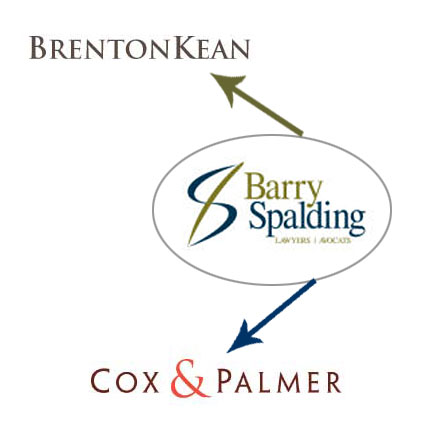Atlantic regional firm Cox & Palmer has grown by 14 new lawyers in the wake of the dissolution of New Brunswick’s Barry Spalding firm on Dec. 31, 2012.

The majority of former Barry Spalding’s lawyers — partners John P. Barry, Hélène L. Beaulieu, Bruce M. Logan, Duane M. McAfee, Brenda G. Noble, David G. O’Brien, Howard A. Spalding, Deirdre L. Wade, and Peter T. Zed; associates Jack M. Blackier, Talia C. Profit, Colin A. Fraser, and Patrick Dunn; and counsel Richard E. DeBow — moved over to Cox & Palmer’s Moncton, N.B., and Saint John, N.B., offices.
Most are commercial and insurance litigators while others joined the firm’s corporate transaction group. These new additions bring Cox & Palmer’s total number of lawyers to just under 200.
However, not everyone made the move to Cox & Palmer. Former Barry Spalding partners Michael D. Brenton, William C. Kean, Maria G. Henheffer, and Donald V. Keenan, along with three associates, launched a new law firm called BrentonKean.
Brenton says it was early last year that several partners at Barry Spalding expressed an interest in moving to a regional firm and Cox & Palmer was a good fit. Although the offer to join the firm was extended to everyone, Brenton says some lawyers were concerned about conflicts issues.
“In this small province, as you can imagine there are only a limited number of larger firms and if everybody gets together then we have real conflict problems,” says Brenton. “So we thanked [Cox & Palmer] . . . declined their offer, and went our own way, primarily to serve our long-standing clients who would’ve been conflicted in a significant way had we joined Cox & Palmer.”
Brenton adds that the firm did not break up over money.
“We were a thriving firm, a very successful firm, and that continued right up until it was dissolved,” he tells
Legal Feeds.
George Cooper, Cox & Palmer’s New Brunswick managing partner, says the move adds strength, depth, and expertise to the firm.
“[A]s the consolidation in the legal market in Canada and Atlantic Canada has continued, this is a really good fit for both the lawyers joining and for Cox & Palmer,” he tells
Legal Feeds.
Cooper says this change wasn’t a result of the economic climate.
“We’re both financially very strong organizations and we were pleased to marry strength to strength,” he says.
Cooper argues that there have been waves of consolidation. “This is part of a trend that I think is driven by client needs for greater specialization and enhanced levels of service, which larger platforms are generally able to provide,” he says.
John Ohnjec, division director at Robert Half Legal, told
Law Times last month that firms have been re-evaluating since the economic downturn to see which practice areas are in demand and then try to reshape their businesses accordingly.
“While I don’t think that necessarily downsizing is the trend, I think the definite trend is to look inward as to what their model is and what’s working and what isn’t working and in some cases that will entail the need to downsize, to become leaner while still being able to service their clients,” he said.

 The majority of former Barry Spalding’s lawyers — partners John P. Barry, Hélène L. Beaulieu, Bruce M. Logan, Duane M. McAfee, Brenda G. Noble, David G. O’Brien, Howard A. Spalding, Deirdre L. Wade, and Peter T. Zed; associates Jack M. Blackier, Talia C. Profit, Colin A. Fraser, and Patrick Dunn; and counsel Richard E. DeBow — moved over to Cox & Palmer’s Moncton, N.B., and Saint John, N.B., offices.
The majority of former Barry Spalding’s lawyers — partners John P. Barry, Hélène L. Beaulieu, Bruce M. Logan, Duane M. McAfee, Brenda G. Noble, David G. O’Brien, Howard A. Spalding, Deirdre L. Wade, and Peter T. Zed; associates Jack M. Blackier, Talia C. Profit, Colin A. Fraser, and Patrick Dunn; and counsel Richard E. DeBow — moved over to Cox & Palmer’s Moncton, N.B., and Saint John, N.B., offices.